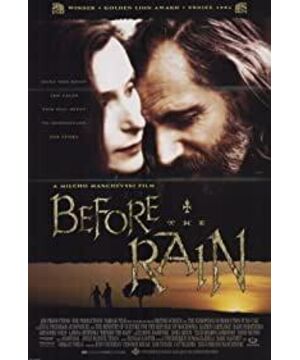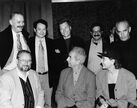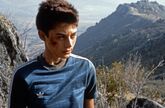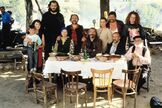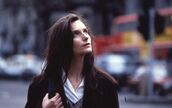One.
Speaking of Macedonian films in the background , perhaps even the most professional European film researchers cannot list one or two. In such a small film country, no more than one film is produced every year. But in 1995, a film turned out and won the Golden Lion Award at the Venice Film Festival, changing this mindset. And this film that changed the history of Macedonian cinema is the debut of "A Rainstorm Is Coming" directed by the young director Mirkmanchevsky.
The film historian Annette Insdorf once called this film "one of the greatest debuts in film and television." Indeed, the technique of this film, the old way of selecting the topic, and its unprecedented unique structure refreshed many people's concept of film. It is hard to imagine that this is the work of a film novice. The director Manchevsky seems to have consumed all his talents by this masterpiece. Although his second film "Dust" was selected as the opening film of the Venice Film Festival, even if there are big names like Joseph Vannes to join, But it is far inferior to the thickness of "A Rainstorm Is Coming", but there are some fancy skills in the shots and editing. And lost the unique feeling that "Heavy Rain is Coming" rooted in Macedonian soil. In 2007, Manchevsky returned to Macedonia and filmed the third film "Shadow".
And this article will study the unique structure and details of the work "A Storm Is Coming" in the form of a pull-sheet. Explore its inner mysterious connection and rhythm.
two. The introductory
film first quoted the work "Death and the Ascetic" by Yugoslavian writer Selimovic. If two keywords were extracted from it, they would be "blood light" and "waiting". These two words constitute the first two elements of "A Storm Is Coming" (the same two elements are also heavily quoted in "Dust" ). These two intentions run through the entire film, and all three works of the director, and this also happens to coincide with the Macedonian war and the status quo of no attribution.
Then the title appeared, and it was noted in the brackets that the movie is a "three-part story", that is, the ring composed of the three parts of the movie "language", "face", and "photo (image)" . And this kind of circle is "a joke with time" in the director's own words
Immediately afterwards, the first story of the film unfolded at 1 minute and 55 seconds. The young priest Kirill appeared on the stage, played by the French actor Georgia Colin (who once starred in "Orihuela," directed by Agni Isza. "Oliviera", Manchevsky also CAST Colin because of seeing this work). At 2 minutes, Kirill killed a fly on the neck, and the same action will be repeated at least twice in the film. This action becomes the first detail that composes the rhythm of the whole film. Analyze later.
At the third minute and thirty-six seconds, another important intent tortoise appeared. The tortoise was manipulated by several boys, symbolizing the involuntary war experienced by Macedonia. And it appeared for the first time, as the most critical line of the film "time is not passing, the ring is no longer". And the deeper level of this fable will be revealed later. The tone of the film has now been established.
three. Speech
first part of the movie - "Speech" starts at about four minutes. At the beginning of this paragraph, the prayers in the church and the children playing outdoors are edited together. The child ignited the tortoise in the ring of fire, and at the same time clipped the statue of the crucifixion. The bullet in the ring of fire killed the tortoise. Violence seems to be everywhere in this country, and the church, which symbolizes the system, will be soon. Withdrawn from peace. If you are familiar with American movies, you can also find that the plot of child cruelty to animals here is imitated from the work "Sunset Yellow Sand" by Sam Packing.
In the seventh minute, Kirill and the heroine Shamiwa met, and Shamiwa's neutral appearance when she first appeared on the scene blurred her gender and was even a little masculine. This also coincides with Shamiwa's leading and leading role in the relationship between the two, that is, she actually only plays a male role in love. On the contrary, Kirill is a quiet and restrained female character.
At 11 minutes, the beginning of the funeral scene was not noticed by the audience when watching the movie for the first time, but this was actually the director's first clear display of the film's ring structure. The audience does not know whose funeral, but when they watch this movie for the second time, they will fully understand the sense of fatalism implied by this funeral. And found that this is a character who will only appear in the second part. Then, the woman who is out of tune with the environment gives the audience an illusion of death. In fact, she is also a character who will appear in the second part.
At 14 minutes, a modern man with a gun entered the church, bringing the audience from the established church with a somewhat blurred time background into a modern savage world. Contrasts timeless religious sacredness and silence with modern violence. It broke the audience's perception of when the story happened. Regardless of the background of the Macedonian War, the film began to develop into the story of "Romeo and Juliet".
In the 20th minute, Kirill was unable to stop the gunmen from killing the cat. Violence and killing had eroded the church, and Shamiva was in a dangerous situation. This is the second place where animals are tortured. The image of "blood light" in the movie becomes more and more prominent.
At 23 minutes, Kirill quoted the praise for love in the "Bible Song of Songs", and at the same time, saw in his dream Shamiwa who had disappeared. Here is the climax of their love, and at the same time borrowing the "Bible" as a transition, it shows that Kirill's excessive concern is creating a gap between himself and his faith. At this time, the dream is raining, and the whole movie is waiting for the final rainstorm. The character mentions rain, the surrounding environment is dry, and the tears of the mourners, but the real rainstorm is only in the dream. It was the first time to come without scruples. Through cross-editing, we found that Kirill's face, who is sleeping in reality, is not shiny. At the same time, Shamiwa did indeed come back in reality.
The 26-minute priest's words "denied your father, rejected your name" are quoted from "Romeo and Juliet". Kirill was driven out of the church. In the church, the rock heard by the gunmen represents the chaos and cruelty of the real world that Kirill is about to enter, and the same rock is repeated in all three parts. Kirill and Shamiwa had begun to dress similarly, and the two gradually became a similar body. The priest's slap and embrace of Kirill represent his doctrinal and inner feelings for Kirill.
At 30 minutes, the two embarked on an escape. Kirill mentioned his brother, a photographer in the UK. Here, the deliberately disrupted timeline and structure are here for the first time showing the three parts of the movie. Connected with subtle details. At this time, Shamiva's grandfather appeared (the actor who played this role died in the post-production of the film, and he was remembered in the ending credits) and forcibly separated the two. Later, Shamiva was shot and killed indiscriminately. Shamiva's last gesture to Kirill was that "don't speak" was the same as the gesture when she first came out. It is the best satire and summary of the first part of the theme "Speech". Silence is all we feel at the beginning and the end. The R&J tragedy ends here.
Four. Face
36 minutes, the movie entered his second part-face. In this part, the heroine of Annie is played by British actor Kathleen Kathleen. If the audience noticed it, they would find that the character's first appearance was in the first part of the funeral. This time, her second appearance was painful in the bathroom, expressing the gloomy emotions of this character. And the mystery behind a layer of fog. Immediately after the lens entered his work and life, a whole new world was revealed in front of us. The rush of reporters, photographers, photographs, and the fast-paced life of London, unprepared, the movie has already taken a turn. It seems that we will never return to the church full of love and hatred.
At 37 minutes, we discovered that Anne’s job was to review photos. The photos of the real Bosnian war in her hand seemed to introduce us to thinking about war and hatred. Then, she sprinkled a cup of coffee on Madonna's photo, which once again seemed to be a satire of the glitzy world outside of war. At 38 minutes, Anne faced the broken mirror, showing her inner broken state. In 39 minutes, the male protagonist photographer Alexander appeared, and he was also the person buried in the first part, but the audience generally did not notice this when they watched it for the first time. The appearance of Alexander in the photo of actor Ben Kingsley also seems to imply that the character has a temperament like Gandhi.
In 40 minutes, "A lot of worries have turned us into cowards" Annie's mother (played by Ferrello, in reality she is the mother of actor Emma Thompson) quoted "Hamlet". Through the conversation, we found that Annie is experiencing a marital crisis. Alexander appeared, he was close to Annie, and at the same time, he mentioned "it's going to rain soon" again. At 42 minutes, Anne's mother once quoted Snoopy's author Charles Schultz, "No matter how difficult things are, we can all go away" quickly shaped the temperament of this character who played a few minutes. At the same time, she mentioned Alexander's winning photo, which is also an important clue.
At 43 minutes, the reflection on the car window expressed the theme of the second part, everything is complicated and rough, not orderly. The reflections and conversations in this car are obviously influenced by Polanski's "Sword in the Water".
In 47 minutes, the two walked into the cemetery. There was a pregnant woman in the background, which had some hints about the character's fate.
At 48 minutes, one of the most interesting scenes in the movie appeared. The photos that Annie watched were exactly the scenes of Kirill and Shamiwa's death in the first part. All the established time here has been broken. If the audience returns to play this paragraph after watching the third part, they will find that this scene has appeared at an impossible point in time. But the appearance here is so natural and sleek, but at the same time, it once again confuses the timeline of the whole film. This creates the illusion that the second part is after the first part. At the same time, Kirill's call came in, and he was looking for his uncle Alexander. These elements appear to persuade the audience to accept a false chronological order. And then, in the 50th minute, the first part of the line appeared again, "Time is not passing, the circle is no longer" seems to also imply the subtle relationship between our movie and the world, as I mentioned before Yes, this movie is joking about time. It is these unexplainable elements that add to the thickness of this movie.
At this time, Alexander left England and went to his home country, Macedonia.
In 51 minutes, I entered the last restaurant to suck, and gave a very short shot of the turtle in the fish tank. Anne's husband Nick appeared. There is extreme tension and anxiety in the restaurant. And the bearded man who entered at this time seemed to come from the violent world of the first part. Annie filed for a divorce, but she still likes her husband's face, and her sensitivity to the face is also the reason why this character became a photographer.
In 55 minutes, the beard fought with the waiter, and the foreign violence easily entered daily life. After the two sides were pulled apart, the beard left the restaurant.
In 58 minutes, the beard returned to the restaurant with a gun. In the chaotic gun, Nick's face was shattered and he died under the bonsai. The violence broke out suddenly and the entire restaurant became a slaughterhouse. Uncomfortable pain, blood, and shouts flooded the camera. In the direct violence, and Annie's bewilderment, the second part ends. Her last line was "Nick, Nick, your face, your face." Violence broke the most beautiful thing. Violence can happen to anyone at any time and anywhere.
five. When the photo is
60 minutes, it enters the third part of the film-the photo. The movie follows Alexander and returns to his native Macedonia. And what is shown here is different from the first part, here is an orderly and carefree Macedonia. But behind this, there is still boundless love and hatred.
In 62 minutes, the UN (United Nations Peacekeeping Forces) armored vehicle appeared, which reminded us of the unstable political situation in Macedonia.
In 64 minutes, the bus and donkey cart appeared in the same shot. It implies the alternation and contradiction of the Macedonian situation. In the bus, Alexander told the soldiers that Annie was hit and killed by a taxi in the car accident. It coincided with the second part that Annie in her heart had died after the last conversation in the taxi.
At 66 minutes, the child with a gun threatened Alexander, and the symbol of violence reappeared. In response to the first part of the children killing the tortoise, we are still returning to the violent Macedonia.
In 68 minutes, Alexander saw his broken home. Under a dilapidated roof, Alexander found the toys he left many years ago. Yes, this is the homeland where he grew up.
In 70 minutes, Alexander returned to his old house. Alexander was moved by the old house that was about to fall. Everything is no longer like before.
For 72 minutes, Alexander hummed the song "Rain Drops on My Head" while riding a bike, which is a tribute to the classic Hollywood movie "Little Tiger". After that, the young boy who didn't wear pants also played with a gun.
For 75 minutes, the family gathered for a dinner, and the characters that appeared in the first part appeared again.
At 76 minutes, Alexander took a photo of the family. At the last second, he killed a fly, echoing the beginning of the movie.
At 83 minutes, Alexander met his old lover Hannah, but Anna had already compromised with life. At the same time, Shamiva flashed in the camera.
In 86 minutes, Annie made a call to Macedonia looking for Alexander, but because of language barriers, she could not communicate with Macedonians. This also led him to personally come to Macedonia in the first part and saw Alexander's funeral. Communication is always difficult.
In 87 minutes, Alexander delivered the lamb. The birth of a new life is accompanied by blood.
In 89 minutes, the male and female couples on the mountain held hands together. New life and love are still sprouting in this war.
"You can't imagine the killing I have seen, when will these hands be washed." The doctor quoted the lines in "Macbeth". And said a key line "War is disease, it will be contagious." At
91 minutes, Alexander mentioned again in the letter that there will be heavy rain. At the same time, a picture of his prize-winning prisoner appeared. It was also this photo that made Alexander start abandoning himself (the executed prisoner in the photo was played by the director of the film Manchevsky). Alexander discovered that the camera can also kill people.
In 95 minutes, Alexander faced the dead compatriot, made a non-existent camera with both hands, and heard the background shutter click. Reality and photos, for Alexander, have been blurred. At the same time, the contradiction between the two tribes intensified.
In 97 minutes, Alexander had a raining dream similar to Kirill in the first part, and their lovers came to them in the dream and in reality, and at the same time hinted at the similarities between Hannah and Shamiwa . Hannah here asks Alexander to help her daughter Shamiva. Hannah hints here that Shamiwa is Alexander's daughter (and Kirill is Alexander's nephew, it seems that Kirill and Shamiwa may be related by blood, although they don't speak well). It implies that there are also such subtle connections between different ethnic groups. All characters have stories behind them.
At 100 minutes, Alexander smoked his first cigarette since he quit smoking. And was choked by the smoke. There was lightning in the sky (same as part one) but the rain still did not fall.
In 103 minutes, a traditional wedding began, and at the same time, Alexander began to help Shamiva. Alexander was eventually beaten to death by his relatives under a tree. Alexander fell, but he did not bleed. Only the bullet holes on the clothes can be seen. The body was turned over, only to see the circle of blood. Before she died, she still said, "It's going to rain." Shamiwa escaped from the hunt and came to the church at the beginning of the first part. We are back to the beginning of the movie. Finally, at the end of the movie, the long-awaited rainstorm finally came, and the beginning and the end of the movie finally became a circle. The last line of the film is another version of "Time does not pass, and the circle is not round". "Time will not wait because the circle will not be complete."
Sixth,
the unique three-stage structure of the film , the circle , has made a circle-like puzzle in time, which makes the audience's viewing experience a brand-new improvement at the end of the film. If it must be divided by time, the order of events should be the second part-the third part-the first part. But the circle is not complete, and what’s more interesting is that because of some of the episodes and details, the poetry-like jumpiness of this movie makes it impossible to divide time into such a simple division. This is precisely this one. The beauty of the film is fully interpretable, transcending reality and rooted in Macedonian soil.
At the same time, the countless coincidences and metaphors in this movie perfectly reflect the rhythm hidden in the movie. Like the rhyme of a poem, every detail is full of thought and meaning.
The director said in an interview, "The first part is more fairy tale, with blue, Byzantine oil painting. The second part is smoother and white. The third part is pagan wood, soil, mud, and brown. Complicated images." The three-fold images mentioned by the director are just like the different characteristics of "heaven", "purgatory" and "hell" in the war-torn Macedonia. Compose an epic about the motherland.
And the choice of colors in these three parts seems to have something in common with Kieslovsky's "Three Colors", which was completed almost at the same time (the third part of "A Rainstorm is Coming" ended in blood light) . It seems that directors from Eastern Europe have a kind of inner sensitivity, a mockery of darkness, and an awareness of human beings. This emotion is felt in Polanski, Kieslowski, the film’s director Manchevsky and even It is reflected in Zanussi's works.
The reason is determined by the special political and historical reasons of Eastern Europe. The Czech Republic, Poland, and Macedonia have all been divided, attached to other countries, and rarely have their own independence. Growing up with such a country will inevitably produce feelings of anxiety and self-doubt. They are forced to explore the current situation of their country and reflect on their own existence value.
As a new force in Eastern Europe, Manchevsky has the lens language of a master of price comparison and inherited the ideological tradition of great Eastern European directors. In this stunning debut, he completed his country, violence and love. Scrutinize. And "Heavy Rain is Coming" is also an important work that opened up the history of Macedonia.
View more about Before the Rain reviews


